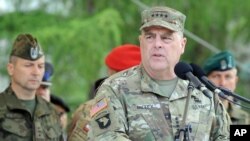U.S. General Mark Milley, chief of staff of the Army, says North Korean missile technology may be advancing faster than expected.
Milley spoke Thursday at the National Press Club in Washington, as North Koreans concluded a day of remembrance to mark the anniversary of the end of the Korean War.
Milley told his audience, “North Korea is extremely dangerous, and more dangerous as the weeks go by.”
'Never seen before'
Earlier this month Pyongyang announced it had completed its first successful test launch of an intercontinental ballistic missile, one expert said could travel far enough to reach the westernmost U.S. states of Alaska or Hawaii.
The launch took U.S. defense experts by surprise. Pentagon officials said it was something they had “never seen before.”
There was speculation that North Korea might use Thursday's anniversary to test-launch a new missile, but late in the day, those fears appeared to have been unfounded.
Earlier Thursday, North Koreans gathered at the mausoleum of North Korean leaders Kim Il Sung and Kim Jong Il to commemorate the day in 1953 when China, North Korea, and the U.S.-backed United Nations signed an agreement to end the struggle over the Korean peninsula.
Peace treaty never signed
The conflict began in 1950 when the Soviet-ruled North invaded the democratically ruled South.
In the North Korean version of the story, the conflict is known as the Fatherland Liberation War. North Korea blames the United States for starting the war that devastated the Korean peninsula and saw the South Korean capital, Seoul, change hands four times.
Because a peace treaty was never signed, the two nations are technically still at war. Pyongyang uses that fact to justify its concentration on military readiness.
Hong Yong-Dok brought his granddaughters to the Kim mausoleum to pay their respects Thursday. He told a French news agency, "Our country is ever-victorious because we have the greatest leaders in the world."






